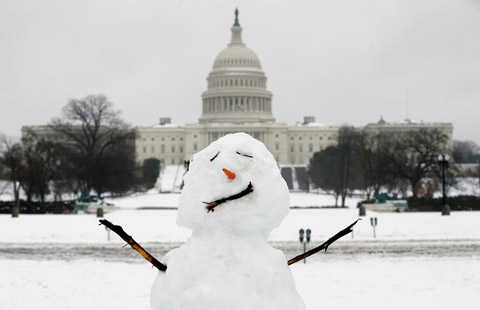Testing times for China's foreign exchange reserves
Updated: 2014-02-18 07:16
By Zhu Ning (China Daily)
|
|||||||||||
Yet, given their relatively high correlation with US T-bills in the grand scheme of things, such diversification within US assets may not offer China a big enough hedge against fluctuations in US economic growth, the budget dilemma or a possible default.
This situation is closely tied to the crux of the problem surrounding China's reserves: The country intends to diversify its reserves into other sovereign treasuries or assets, but it can find few alternatives.
|
 |
|
 |
Ignoring the economic situation of these regions for a moment, one would find the markets for such securities are small compared with those for US T-bills and agency securities.
Given the massive size of China's reserves, withdrawing from such a market would have profound effects and would inevitably damage the value of China's reserves.
One very important function of reserves is to serve as "ballast assets" that can be used to stabilize the value of a country's currency.
As a result, liquidity, immediacy and stability are crucial to reserve investments, and in this regard, US Treasury bills serve as a near-perfect choice.
However, many experts, including some Chinese central bank officials, believe that China's reserves are too large and a big chunk of them could be invested not for stability but for higher returns. If this is true, the real question becomes what the optimal size of China's reserves should be.
Although China has been trying hard to diversify into non-US-denominated assets over the past few years, the ballooning size of its reserves increases rather than decreases China's exposure to risk, and that seems to be the cause of Chinese anxiety over US fiscal problems.
If this is the problem, China should deepen its financial reforms, letting market forces determine its domestic interest rates and international exchange rate. Once China stops its passive "sterilization" of the inflows of dollars into its reserves, China's reserve investment challenges - along with many other challenges, such as domestic inflation and high housing prices - may be resolved once and for all.
The author is deputy director of the Shanghai Advanced Institute of Finance, Shanghai Jiaotong University.
Related Stories
China's forex reserves reach $3.82t 2014-01-15 11:07
Currency reserve to assist liquidity 2013-09-06 08:56
Managing forex reserves 2013-06-19 09:56
China to pursue RMB internationalization 2013-01-28 10:20
Office established to handle forex reserve loans 2013-01-14 15:59
China's foreign financial assets hit $5t 2012-12-29 11:09
Today's Top News
Renzi given mandate to form new Italian gov't
Ukraine's amnesty law takes effect
Xi calls on leaders to carry out new reforms
Cross-Straits talks possible
Bigger China role in the Arctic
501 arrested in sex trade crackdown
Policeman gets death sentence
EU halts education talks with Switzerland
Hot Topics
Lunar probe , China growth forecasts, Emission rules get tougher, China seen through 'colored lens', International board,
Editor's Picks

|

|

|

|

|

|





